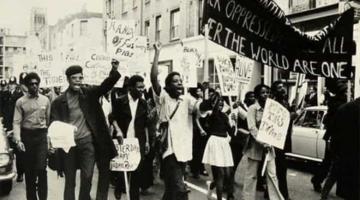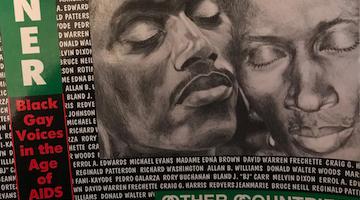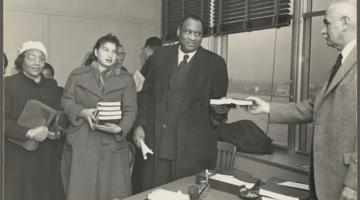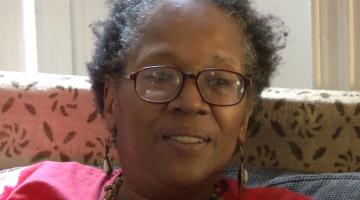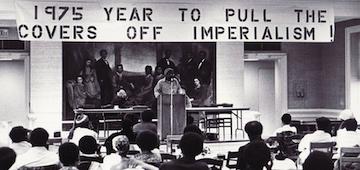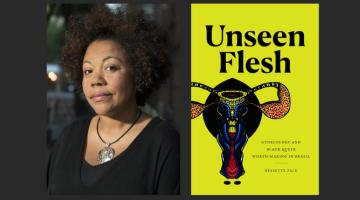A 1980 speech by Black lesbian poet and activist Pat Parker provides a feminist, anti-imperialist blueprint for the present.
In 1980, the late Texas-born, Oakland based Black lesbian poet and activist Pat Parker gave a speech at ¡Basta! Women's Conference On Imperialism And Third World War. Held over three days in August at the YWCA in Oakland, the national conference was organized to examine “the relationship of imperialism to the women's movement, national liberation struggles, war preparations and U.S. military build-up.” Titled “Revolution: It’s Not Easy, Quick, or Pretty,” Parker’s speech analyzed those relationships with the same uncompromised intensity, verve, and clarity as her poems. In the speech, Parker shows herself to be a militant, unabashed anti-imperialist. She rejects patriotism while naming the ethical and political contradictions of being a Black citizen of an imperialist state. She refuses co-option and misdirection and reformism and “counter-revolutionary bullshit,” of middle class white feminism and insists that revolution is only possible if left by the “poor and working class of this country.”At the same time, she reognizes that the poor and working class are “oppressed throughout the world by imperialist powers.”
Parker also demands that we not settle for limited political and economic gains at home that come through the extension of the war-machine abroad: “I do not wish to have the world colonized, bombarded and plundered in order to eat steak.” And while Parker argues that imperialism everywhere is in a state of crisis, she also cautions that building revolutionary societies is not a quick, short-term project but it requires tireless labor and long-term commitment.
First published in the important anthology This Bridge Called My Back: Writings by Radical Women of Color, edited by Cherríe Moraga and Gloria E. Anzaldúa, Parker’s speech is prescient – and timely. We reproduce it below.
Revolution: It’s Not Easy, Quick, or Pretty
Pat Parker
I have been to many conferences: People’s Constitutional convention in Washington, D.C., Women’s Conference on Violence in San Francisco, Lesbian conference in Los Angeles, International Tribunal on Crimes Against Women in Belgium. I’ve been to more conferences than I can name and to many I would like to forget, but I have never come to a conference with as much anticipation and feeling of urgency.
We are in a critical time. Imperialist forces in the world are finding themselves backed against the wall; no longer able to control the world with the threat of force. And they are getting desperate. And they should be desperate. What we do here this weekend and what we take from this conference can be the difference, the deciding factor as to whether a group of women will ever again be able to meet not only in this country, but the entire world. We are facing the most critical time in the history of the world. The superpowers cannot afford for us to join forces and work to rid this earth of them, and we cannot afford not to.
In order to leave here prepared to be a strong force in the fight against imperialism we must have a clear understanding of what imperialism is and how it manifests itself in our lives. It is perhaps easier for us to understand the nature of imperialism when we look at how this country deals with other countries. It doesn’t take a great amount of political sophistication to see how the interest of oil companies played a role in our relationship with the Shah’s Iran. The people of Iran were exploited in order for Americans to drive gas guzzling monsters. And that is perhaps the difficult part of imperialism for us to understand.
The rest of the world is being exploited in order to maintain our standard of living. We who are 5 percent of the world’s population use 40 percent of the world’s oil.
As anti-imperialists we must be prepared to destroy all imperialist governments; and we must realize that by doing this we will drastically alter the standard of living that we now enjoy. We cannot talk on one hand about making revolution in this country, yet be unwilling to give up our video tape records and recreational vehicles. An anti-imperialist understands the exploitation of the working class, understands that in order for capitalism to function, there must be a certain percentage that is unemployed. We must also define our friends and enemies based on their stand on imperialism.
At this time, the super powers are in a state of decline. The Iranians rose up and said no to U.S. imperialism; the Afghanis and Eritreans are saying no to Soviet-social imperialism. The situation has become critical and the only resource left is world war between the U.S. and the Soviet Union. We are daily being given warning that war is imminent. To some people, this is no significant change, just escalation. The Blacks, poor whites, Chicanos, and other oppressed people of this country already know we’re at war.
And the rest of the country’s people are being prepared. The media is bombarding us with patriotic declarations about “our” hostages and “our” embassy in Iran. This government is constantly reminding us of our commitment to our allies in Israel. Ads inviting us to become the few, the chosen, the marines or fly with the air force, etc. are filling our television screens.
And it doesn’t stop there. This system is insidious in its machinations. It’s no coincidence that the “right wing” of this country is being mobilized. Media sources are bombarding us with the news of KKK and Nazi party activity. But we who were involved in the civil rights movement are very familiar with these tactics. We remember the revelations of FBI agents, not only infiltrating the Klan but participating in and leading their activities. And we are not for one moment fooled by these manipulations.
The Klan and the Nazis are our enemies and must be stopped, but to simply mobilize around stopping them is not enough. They are functionaries, tools of this governmental system. They serve in the same way as our armed forces and police. To end Klan or Nazi activity doesn’t end imperialism. It doesn’t end institutional racism; it doesn’t end sexism; it does not bring this monster down, and we must not forget what our goals are and who our enemies are. To simply label these people as lunatic fringes and not accurately assess their roles as part of this system is a dangerous error. These people do the dirty work. They are the arms and legs of the congressmen, the businessmen, the Tri-lateral Commission.
And the message they bring is coming clear. Be a good American — Support registration for the draft. The equation is being laid out in front of us. Good American = Support imperialism and war.
To this, I must declare — I am not a good American. I do not wish to have the world colonized, bombarded and plundered in order to eat steak.
Each time a national liberation victory is won I applaud and support it. It means we are one step closer to ending the madness that we live under. It means we weaken the chains that are binding the world.
Yet to support national liberation struggles alone is not enough. We must actively fight within the confines of this country to bring it down. I am not prepared to let other nationalities do my dirty work for me. I want the people of Iran to be free. I want the people of Puerto Rico to be free, but I am a revolutionary feminist because I want me to be free. And it is critically important to me that you who are here, that your commitment to revolution is based on the fact that you want revolution for yourself.
In order for revolution to be possible, and revolution is possible, it must be led by the poor and working class of this country. Our interest does not lie with being a part of this system, and our tendencies to be co-opted and diverted are lessened by the realization of our oppression. We know and understand that our oppression is not simply a question of nationality but that poor and working class people are oppressed throughout the world by imperialist powers.
We as women face a particular oppression, not in a vacuum but as a part of this corrupt system. The issues of women are the issues of the working class as well. By not having this understanding, the women’s movement has allowed itself to be co-opted and mis-directed.
It is unthinkable to me as a revolutionary feminist that some women’s liberationist would entertain the notion that women should be drafted in exchange for passage of the ERA. This is a clear example of not understanding imperialism and not basing one’s political line on its destruction. If the passage of the ERA means that I am going to become an equal participant in the exploitation of the world; that I am going to bear arms against other Third World people who are fighting to reclaim what is rightfully theirs — then I say Fuck the ERA.
One of the difficult questions for us to understand is just “what is revolution?” Perhaps we have had too many years of media madness with “revolutionary eye make-up and revolutionary tampons.” Perhaps we have had too many years of Hollywood fantasy where the revolutionary man kills his enemies and walks off into the sunset with his revolutionary woman who has been waiting for his return. And that’s the end of the tale.
The reality is that revolution is not a one step process: you fight — you win — it’s over. It takes years. Long after the smoke of the last gun has faded away the struggle to build a society that is classless, that has no traces of sexism and racism in it, will still be going on. We have many examples of societies in our lifetime that have had successful armed revolution. And we have no examples of any country that has completed the revolutionary process. Is Russia now the society that Marx and Lenin dreamed? Is China the society that Mao dreamed? Before and after revolution there must be education, and analysis, and struggle. If not, and even if so, one will be faced with coups, counter-revolution and revision.
The other illusion is that revolution is neat. It’s not neat or pretty or quick. It is a long dirty process. We will be faced with decisions that are not easy. We will have to consider the deaths of friends and family. We will be faced with the decision of killing members of our own race.
Another illusion that we suffer under in this country is that a single facet of the population can make revolution. Black people alone cannot make a revolution in this country. Native American people alone cannot make revolution in this country. Chicanos alone cannot make revolution in this country. Asians alone cannot make revolution in this country. White people alone cannot make revolution in this country. Women alone cannot make revolution in this country. Gay people alone cannot make revolution in this country. And anyone who tries will be unsuccessful.
Yet it is critically important for women to take a leadership role in this struggle. And I do not mean leading the way to the coffee machine.
A part of the task charged to us this week-end is deciding the direction we must take. First I say let us reclaim our movement. For too long I have watched the white-middle class be represented as my leaders in the women’s movement. I have often heard that the women’s movement is a white middle class movement.
I am a feminist. I am neither white nor middle class. And the women that I’ve worked with were like me. Yet I am told that we don’t exist, and that we didn’t exist. Now I understand that the racism and classism of some women in the movement prevented them from seeing me and people like me. But I also understand that with the aid of the media many middle class women were made more visible. And this gave them an opportunity to use their skills gained through their privilege to lead the movement into at first reformist and now a counter-revolutionary bullshit.
These women allowed themselves to be red-baited and dyke-baited into isolating and ignoring the progressive elements of the women’s movement. And I, for one, am no longer willing to watch a group of self-serving reformist idiots continue to abort the demands of revolutionary thinking women. You and I are the women’s movement. Its leadership and direction should come from us.
We are charged with the task of rebuilding and revitalizing the dreams of the 60’s and turning it into the realities of the 80’s. And it will not be easy. At the same time that we must weed reformist elements out of our movement we will have to fight tooth and nail with our brothers and sisters of the left. For in reality, we are “all products of a decadent capitalist society.”
At the same time that we must understand and support the men and women in national liberation struggles — the left must give up its undying loyalty to the nuclear family. In the same way it is difficult for upper and middle class women to give up their commitment to the nuclear family, but the nuclear family is the basic unit of capitalism and in order for us move to revolution it has to be destroyed. And I mean destroyed. The male left has duped too many women with cries of genocide into believing it is revolutionary to be bound to babies. As to the question of abortion, I am appalled at the presumptions of men. The question is whether or not we have control of our bodies which in turn means control of our community and its growth. I believe that Black women are as intelligent as white women and we know when to have babies or not.
And I want no man regardless of color to tell me when and where to bear children. As long as women are bound by the nuclear family structure we cannot effectively move toward revolution. And if women don’t move, it will not happen.
We do not have an easy task before us. At this conference we will disagree; we will get angry; we will fight. This is good and should be welcomed. Here is where we should air our differences but here is also where we should build. In order to survive in this world we must make a commitment to change it; not reform it — revolutionize it. Here is where we begin to build a new women’s movement, not one easily co-opted and mis-directed by media pigs and agents of this insidious imperialist system. Here is where we begin to build a revolutionary force of women. Judy Grahn in the “She Who” poems says, “When she who moves, the earth will turn over.” You and I are the she who and if we dare to struggle, dare to win, this earth will turn over.
Pat Parker, “Revolution: It’s Not Easy, Quick, or Pretty,” in This Bridge Called My Back: Writings by Radical Women of Color, edited by Cherríe Moraga and Gloria E. Anzaldúa (Persephone Press, 1981; Kitchen Table: Women of Color Press, 1983).


